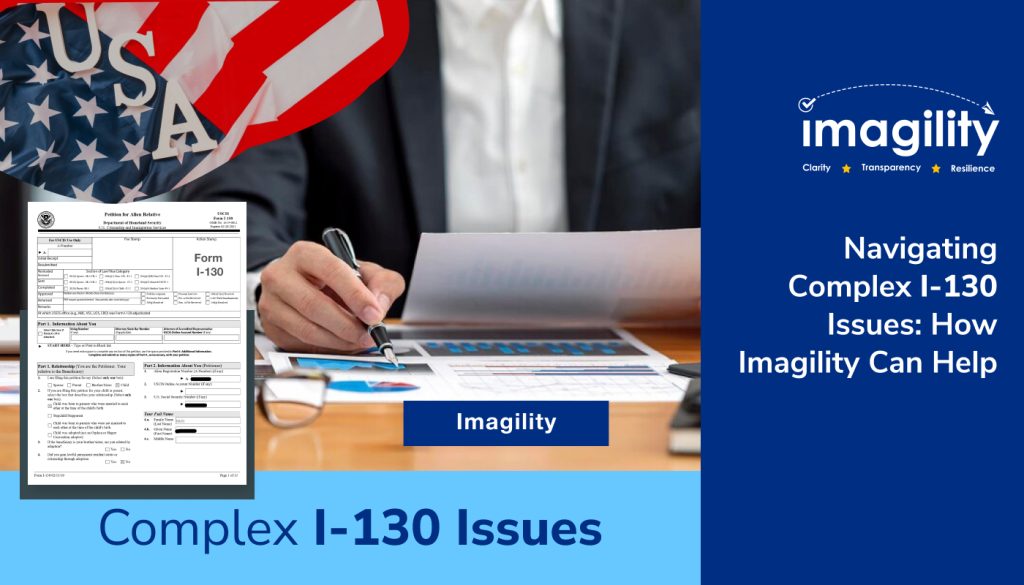When it comes to family-based immigration, the I-130 Petition for Alien Relatives is a key step in bringing families together in the United States. However, even simple cases can become complicated, causing delays, denials, and frustration.
Handling family-based immigration through the I-130 Petition can be tricky. Immigration lawyers often deal with various challenges, such as making sure all documents are correct and dealing with possible denials.
This blog explores common issues with I-130 petitions and offers tips on how Imagility’s AI-enabled features can help solve them.
Common Complexities in I-130 Petitions
The I-130 petition process, though seemingly straightforward, can present various challenges:
Incomplete or Incorrect Forms: Filling out immigration forms with errors or missing information can result in delays or rejections. Even minor mistakes can have serious repercussions.
Supporting Documentation: Collecting and submitting all required documents can be difficult, particularly with clients who have complex histories or missing paperwork.
Eligibility Issues: Determining who qualifies for the I-130 petition can be complicated, especially for stepchildren, adopted children, or unique family relationships.
Communication with Clients: Keeping clear and consistent communication with clients can be challenging, particularly if there are language differences or if clients are in different time zones.
Processing Delays: USCIS processing times are often unpredictable, and delays can happen due to high caseloads, staffing shortages, or administrative backlogs.
Requests for Evidence (RFEs): If USCIS needs more evidence or information, they issue an RFE. Addressing RFEs requires careful attention to detail and prompt submission.
How AI and Automation Can Help
AI and automation technologies can significantly mitigate these challenges, providing tools and capabilities that enhance accuracy, efficiency, and compliance in handling I-130 petitions.
1. Automated Document Management
AI-driven document management systems can streamline the collection, organization, and verification of required documents. These systems ensure that all necessary paperwork is complete and correctly formatted, reducing the risk of omissions or errors. By automating document management, attorneys can save time and focus on more complex legal tasks.
2. Enhanced Data Accuracy
AI tools can cross-check information across various documents and databases to ensure consistency and accuracy. This reduces the likelihood of discrepancies that can lead to denials or delays. For example, AI can verify that the names, dates, and other critical details match across all submitted documents.
3. Predictive Analytics for Case Outcomes
Predictive analytics can provide valuable insights into the potential outcomes of I-130 petitions. By analyzing historical data and identifying patterns, AI can help attorneys anticipate challenges and develop strategies to address them proactively. This can be particularly useful in cases with complicating factors, such as prior immigration violations or criminal records.
4. Streamlined Communication and Follow-Up
Automation tools can manage communications with clients and government agencies, ensuring timely follow-ups and responses to NOIDs and NOIRs. Automated reminders and alerts help ensure that critical deadlines are met, and necessary actions are taken promptly.
5. Proof of Relationship Verification
AI-powered software can assist in verifying the authenticity of the petitioner-beneficiary relationship. Machine learning algorithms can analyze patterns and detect anomalies in provided evidence, such as photographs, financial records, and communication logs. This helps in building a robust case for the bona fide nature of the relationship.
How Imagility Can Help
Imagility is a cloud-based, end-to-end immigration software platform designed to streamline and optimize the I-130 petition process with powerful AI and automation features.
1. Petition Builder
Imagility’s Petition Builder ensures that all information on forms is accurate and complete, minimizing the risk of errors and omissions.
2. Document Management
Imagility’s document management feature simplifies the collection and organization of documents, ensuring a complete and easily accessible document set.
3. Eligibility Assessment
With Imagility’s leads feature, attorneys can determine ahead of time if a client is eligible for an I-130 petition and filter out ineligible cases early on.
4. Communication Tools
Imagility’s communication features, such as notifications, triggers, and mobile alerts, help maintain clear and consistent communication with clients, overcoming barriers such as language differences and time zones.
5. Processing Delay Notice Board
Imagility provides a processing timeline that is accessible to both the law firm and its clients, keeping everyone informed of any changes or delays.
6. RFE Response Building
Imagility’s RFE response-building feature allows law firms to create and manage RFEs quickly, using available information and requesting additional documents as needed to complete the RFE.
Conclusion
Navigating the complexities of I-130 petitions can be daunting, but Imagility offers powerful solutions to streamline the process. By leveraging Imagility’s innovative features, immigration attorneys can enhance accuracy, efficiency, and compliance, ultimately helping families reunite more quickly and smoothly.
For more information on how Imagility can transform your immigration practice, contact us at sales@imagility.co or visit our website at www.imagility.co.









